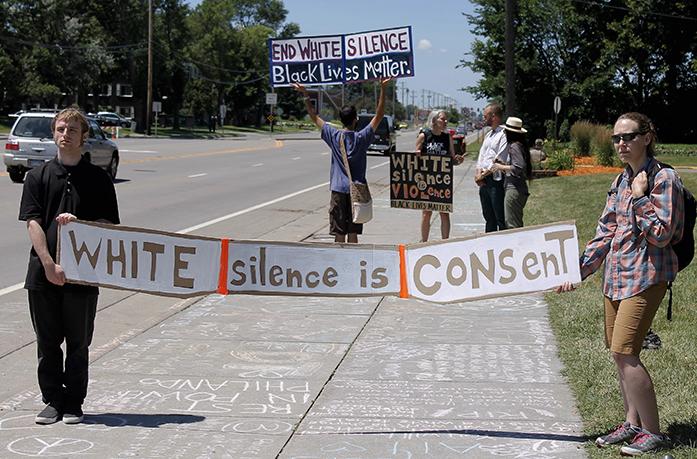By Joe Lane
Philando Castile is dead. And the only account we currently have indicates an unparalleled injustice.
Castile was killed by a police officer in the Minnesota town of Falcon Heights, 20 minutes from my home. He worked at the Montessori school I attended as a child. A school in which, as a white student, I often did not feel like a member of the majority. When my family moved, and I toured my new elementary school in a suburb of St. Paul, I’ll never forget asking my mom, “Where are all the black kids?”
My parents always made certain, beyond a shadow of a doubt, that I grew up in an environment in which the only thing that was acceptable to hate was the word itself. And while my childhood was spent nestled deep in diversity, I never understood the idea of white privilege. Until last week.
The night after Castile was killed, I walked out of work and saw a white man ask a black man, in a knowing tone, how he was doing.
The black man responded, “Just thankful to be on this side of the grass.”
And there it was. In that moment I realized not only what white privilege is, but that I, of course, have it.
We have only one — still incomplete — side of this story upon which to base our understanding. But it would certainly appear as though an innocent man was shot numerous times in his car, in front of a child and her mother. It would certainly appear as though Castile’s race led a police officer to make a snap judgment that may change the course of history. So I’m left asking myself: If this situation had unfolded with me at the wheel, would I be dead? Would a police officer have shot me numerous times?
I don’t know.
And even as I question how this story could possibly be anything other than what it seems to be, I continue to struggle.
My brain, with its modicum of knowledge on the U.S. legal system, is telling me to withhold judgment of the scenario until we know the facts. And I know I have to feel this way, lest my opinions be proven drastically wrong. But my heart, after seeing this story far too many times, is inclined to believe the Facebook live video the world watched in awe on Wednesday night.
I don’t know what it’s like to conduct a traffic stop. I don’t know what it’s like to hear that the person whose day you may be ruining has a gun. So I can’t say with complete confidence how I would react. I’d like to think I would remain calm — that I could handle the scenario professionally. But I just don’t know.
I also don’t know, however, what it’s like to be black in America. I don’t know what it’s like to get in my car to go to work and legitimately fear that a run-in with an individual paid to protect me may lead to my demise. That’s my white privilege at work. And that’s something I’ve taken for granted.
But even as I come to this realization at 21 years old, I still have doubts.
I have doubts whether protesting is the route to change. That the change brought on by protesting is the kind we want.
Do we want establishments to change their actions simply to prevent further daily nuisance? Or do we want real change?
Change driven by a shift in the collective view and appreciation of diversity. Change driven not by the dropping of concrete blocks on the heads of officers or the throwing of Molotov cocktails but by the education of the public. Change not made out of weariness of the status quo but out of a realization that the status quo is simply wrong.
I have doubts, as our country slips back 50 years to the tumultuous times of the 1960s, whether we will ever see the elimination of prejudice.
I have doubts, too, about questioning the juries who know so much more about the cases than I ever will and who reach the verdicts for the Trayvon Martins, Michael Browns, and Eric Garners of the world.
Yes, I have doubts. But these doubts aren’t for myself. Because even if the story of Castile’s death proves to be nothing as it now seems, we still cannot deny the existence of a problem.
We are falling back into a very uncertain, very dangerous time in U.S. history, but the scariest part is that we’ve seen this before. And we now know, we will probably see it again.



